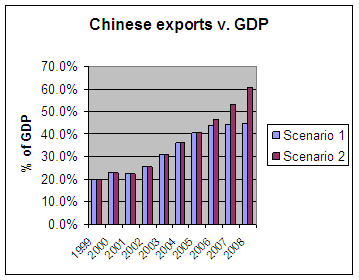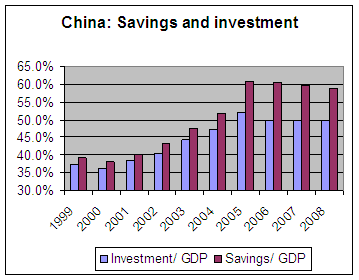China’s economy in 2005 is not what it was in 2000
More on:
China always has depended on export-led growth. It is a core reason why China has been so successful. China is just trying to hold on to the core of its success in the face of political pressure from Washington DC
China always has saved a lot. It is cultural - all of East Asia saves a lot.
I hear those arguments a lot.
I think they miss a key point. Even by Chinese standards, China is now exceptionally dependent on exports. Exports are now about twice as large a share of China's GDP as they were in 2000. And even by Chinese standards, China now saves a lot. By my calculations, savings are up by more 15% of GDP relative to 2000.
Both points are worth exploring in a bit more depth. I even did a couple of Calculated Risk style graphs.
1) China's exports have increased rapidly as a share of GDP. That is what happens if exports grow at 30% y/y for several years in a row. The latest data suggests China's exports are still growing at a close to 30% y/y pace - or well over two times as fast as the growth of nominal GDP. July exports were 29% higher than July exports a year ago, and China's exports in the first seven months of 2005 are 33% higher than its exports in the first seven months of 2004. Clearly, exports continue to rise relative to China's GDP
Until recently, imports also were rising as a share of China's GDP. But not this year. y/y import growth in July was only 12.5% -- right in line with GDP growth. The sharp deceleration of China's import growth could signal a slowdown inside China. But that is hard to square with the 30% y/y export growth (that is a powerful stimulus to any economy where exports are about 40% of total output) and still surging investment. Or it could signal that China capacity to produce intermediate goods - think steel and chemicals - has increased to the point where it no longer needs to import these products. That is Jonathan Anderson's argument. Nerys Avery of Bloomberg notes that China's imports of auto parts are falling as firms producing cars in China increasingly rely on locally made parts. I suspect China's now huge electronics industry also is increasingly substituting local Chinese components for imported components.
I don't think China's exports can keep growing faster than Chinese GDP, nor do I think China's exports can keep growing at 30% y/y while its imports increase at about ½ that rate. That kind of export and import growth, if sustained, would generate a Chinese trade surplus of around $250 billion in 2006 - over 10% of China's GDP.
Consider this graph.

In scenario 1, nominal export growth slows to about 15% by 2007 -- or just a bit faster than nominal GDP growth (in dollar terms, I have China's GDP growing at 13.5% a year, there is a small appreciation of the RMB built into the scenario). Compare that with scenario 2, where exports continue to grow at 30% y/y. That would push China's exports to GDP ratio up to 60% in 2008 - roughly three times what it was in 1999 or 2000.
I don't think that will happen. Indeed, I increasingly think China's dependence on exports is a sign of weakness, not of a sign of strength. Chinese domestic demand is not growing fast enough to match the increase in China's production capacity. Politically, it is unrealistic for China to expect to rely on exports to solve its domestic problems - whether deflation or a lack of domestic demand. And as exports rise toward unheard of levels for a major, continental scaled economy, China increasingly is exposed to the global business cycle. And its dependence on the US - a country that cannot afford to buy all the products it currently buys from China without a huge, subsidized credit line from the Chinese government - is equally unhealthy, and is a major risk to China.
2) Savings and investment. Just as exports are a far higher share of China's GDP than they were just a few years ago, so are savings (and investment).
Consider this graph. The saving rate is derived using official data on investment growth to estimate the 2005 investment to GDP ratio and my forecast for China's 2005 current account surplus (around 8% of GDP - based on a trade surplus of around $120 b and $45 billion surplus on services, transfers and investment income, roughly the same as last year).

The implied savings rates look a bit ridiculous, but the intuition behind the rising savings rate is not that hard to understand.
Investment is increasing faster than GDP, so investment as a share of GDP is rising. In the first half of 2005, investment grew by 25% .
China's trade and current account surplus is rising.
The current account surplus is the gap between domestic savings and domestic investment.
Hence - if the data China is reporting is at all close to accurate - savings is rising even faster than investment. It has now reached an absurdly high level relative to China's GDP.
The result: China's economy looks even more unbalanced than the US economy, with far too much savings (and too little consumption) and far too much reliance on exports.
I don't think that China's current dependence on exports is an argument against letting the RMB appreciate. So long as the RMB remains at close to its current level, strong incentives will remain to continue to over-invest in China's export sector. That just adds to China's problems when - and I think it is a question of when, not if - the RMB starts to appreciate significantly in real terms, whether from a change in the RMB/ $ (and RMB/ euro), rising inflation in China, or (my fear) deflation in China's trading partners. The overarching goal of Chinese economic policy right now should be to find ways to make its economy less dependent on exports.
The New York Times is right - it is hard not to notice signs of growing strain in the US-Chinese economic relationship (Strains I thought Richard Fisher of the Dallas Fed glossed over a bit in his speech back in June). I am not sure that better the answer here though is better diplomacy or "muzzling" the anti-China crowd. Some US angst is a reaction to the pace of China's economic rise. China is on track to export as many goods as the US in 2006, despite having an economy (in dollar terms) barely 1/6th the size of the US economy. But I don't think US concerns are just the result of irrational fears about China's economic emergence - they also stem from the very large imbalances inside China's economy and the equally large imbalances inside the US economy. These imbalances give rise to real frictions and strains that will make crafting a global economic order that reflects China's emergence more difficult than it otherwise would be.
I do not believe Chinese-US economic strains can be solved with better public diplomacy, so to speak. Putting US-Chinese economic (and ultimately political) relations on a firmer footing requires taking real action to address the very real underlying imbalances. It is not healthy for the "America's financial stability" to rest "on the continued Chinese purchase of [US] government's debt." It is not heathly China's financial stability to rest on continued 30% year over year export growth. The US will have to accept the reality of China's economic power, something that it has yet to do. But China also will have to recognize that its economy is now too large for it to rely on exports to solve its domestic economic problems.
I don't see much willingness to make the needed changes on either side of the Pacific. US policy makers are not worried about the US current account deficit - they see nothing in the US economy that calls for a shift in policy. And China's policy makers strike me as too timid to take the needed steps to preempt the emergence of even larger imbalances - imbalances between China's productive capacity and its demand, between its exports and its imports, and the imbalance between investment and savings that is sure to persist if savings remains as high as it is now in China. The 5% revaluation proposed by the China's central bank governor was judged to radical by the state council. I worry that China's policy steps that the political traffic in Beijing will bear will leave Chinese policy two steps behind the fast changing world - and Chinese -- economy.
More on:
 Online Store
Online Store
